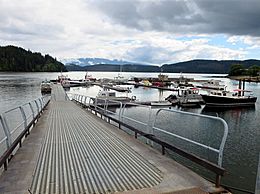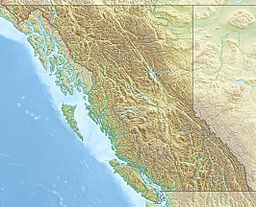Quatsino Sound facts for kids
Quick facts for kids Quatsino Sound |
|
|---|---|
| French: Baie Quatsino | |

Coal Harbour, a village located in Holberg Inlet
|
|
| Location | Vancouver Island, British Columbia |
| Coordinates | 50°30′30″N 127°42′00″W / 50.50833°N 127.70000°W |
| Ocean/sea sources | Pacific Ocean |
| Islands | Drake Island |
| Sections/sub-basins | Forward Inlet, Holberg Inlet, Koskimo Bay, Koprino Harbour, Neroutsos Inlet, Rupert Inlet |
| Settlements | Coal Harbour, Holberg, Port Alice, Quatsino, Winter Harbour |
Quatsino Sound is a group of coastal waterways, bays, and islands. You can find it on the northwestern side of Vancouver Island in British Columbia, Canada. It's the most northern of five large inlets that cut into the west coast of Vancouver Island. The other four are Kyuquot Sound, Nootka Sound, Clayoquot Sound, and Barkley Sound.
Contents
Exploring Quatsino Sound's Geography
Quatsino Sound stretches eastward from the mighty Pacific Ocean. As you enter the sound, you'll find Forward Inlet on the north side. This inlet then splits into several smaller waterways. One of these is Winter Harbour, where the small village of Winter Harbour is located.
Bays and Harbours in the Sound
Further east into Quatsino Sound, you'll discover Koskimo Bay and Koprino Harbour. These areas offer sheltered spots along the coast.
Drake Island and Neroutsos Inlet
Near the eastern end of Quatsino Sound lies Drake Island. This island was named after Justice Montague Tyrwhitt-Drake, who was the Mayor of Victoria from 1876 to 1877. From Drake Island, the long Neroutsos Inlet extends towards the southeast. The town of Port Alice is located near the very end of Neroutsos Inlet.
Quatsino Narrows and Tidal Currents
East of Drake Island, a narrow passage called Quatsino Narrows connects the eastern part of Quatsino Sound to Holberg Inlet and the smaller Rupert Inlet. Quatsino Narrows is known for its strong currents. These are called tidal rapids, or sometimes "skookumchucks" in British Columbia. The water can flow very fast here, reaching speeds of about 9 knots (17 kilometers per hour) when the tide comes in. The entire sound is part of the Regional District of Mount Waddington.
 | Isaac Myers |
 | D. Hamilton Jackson |
 | A. Philip Randolph |


